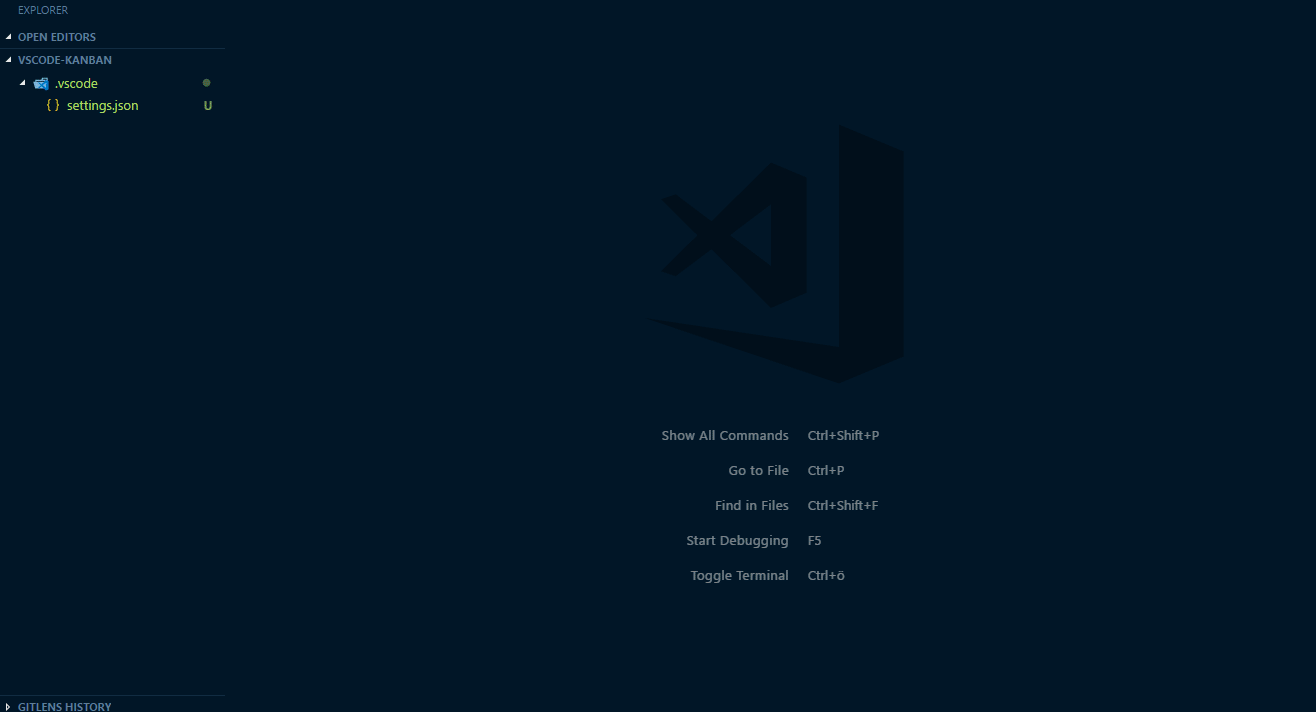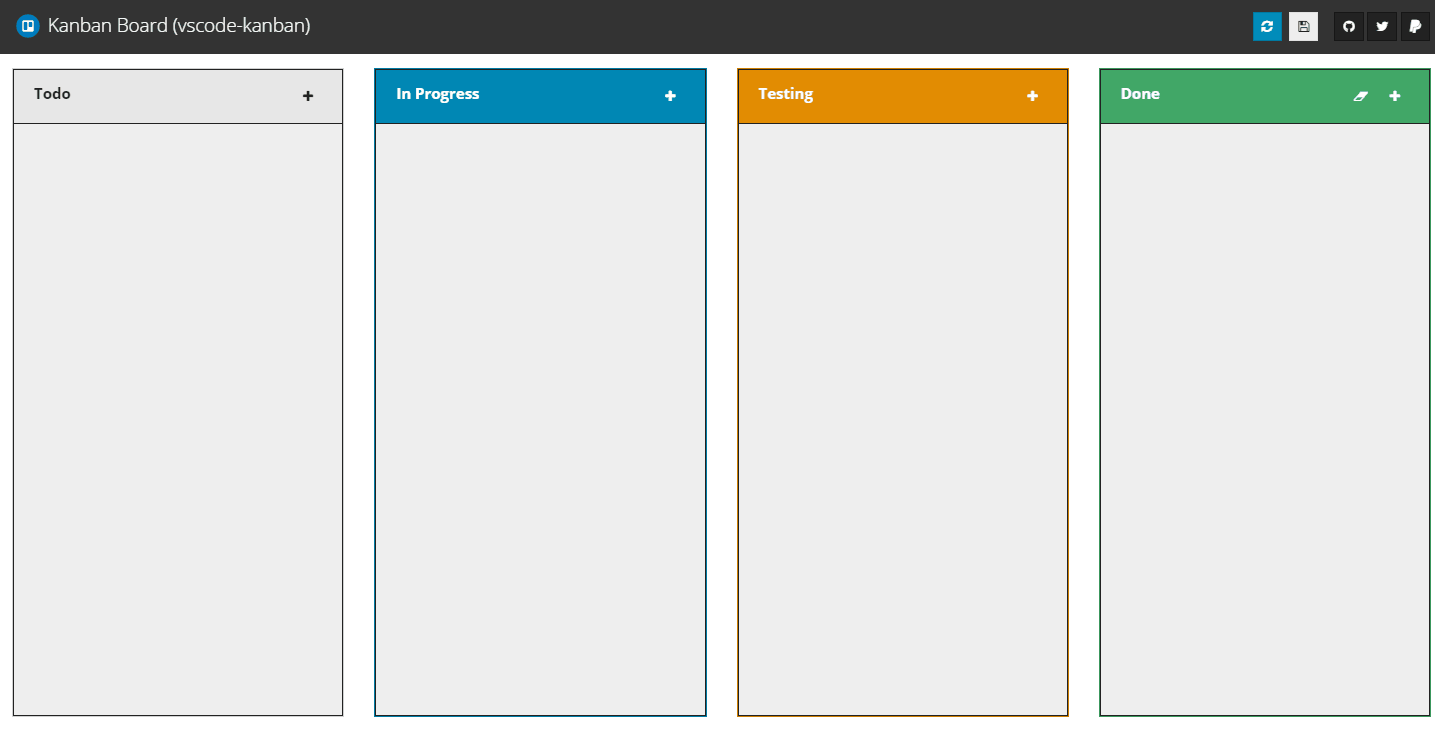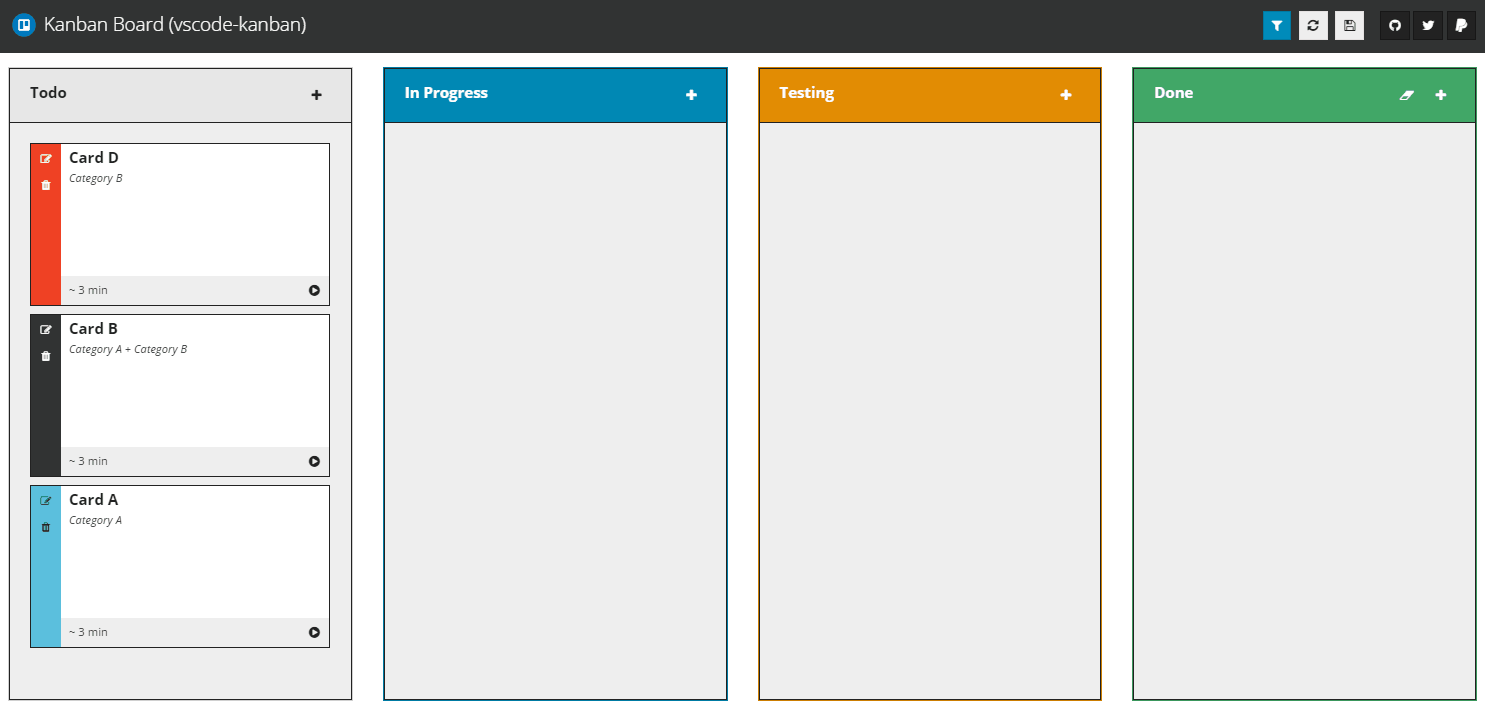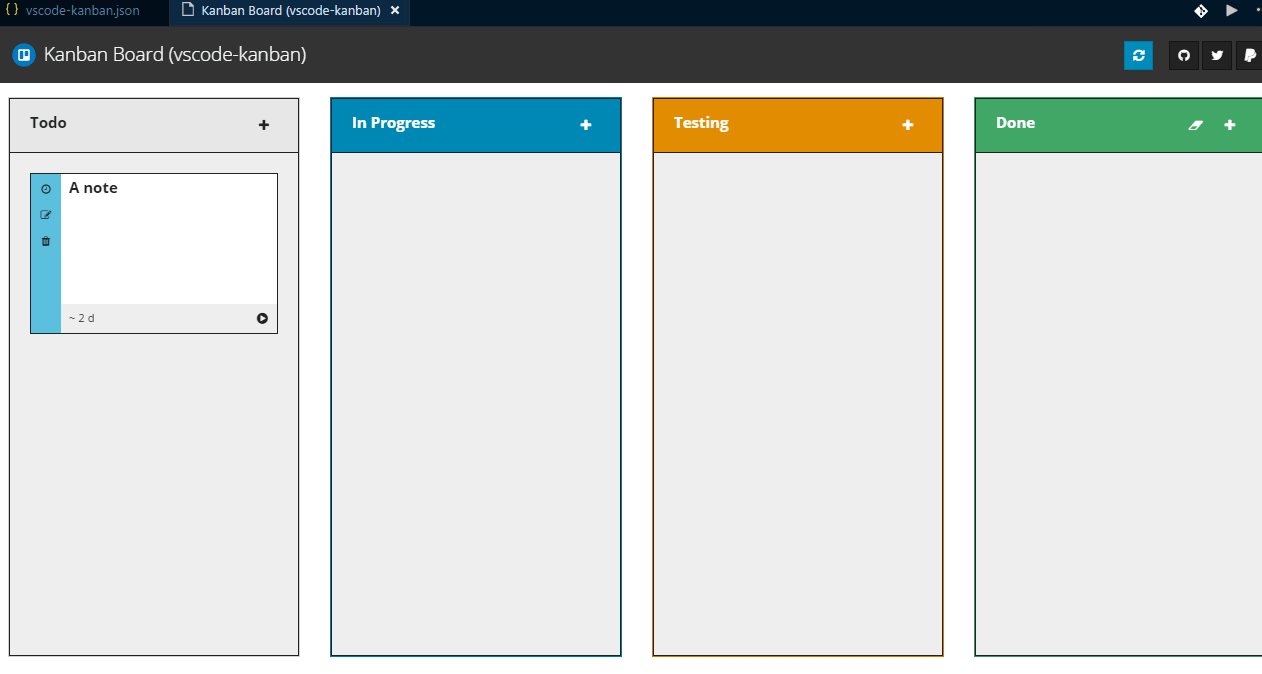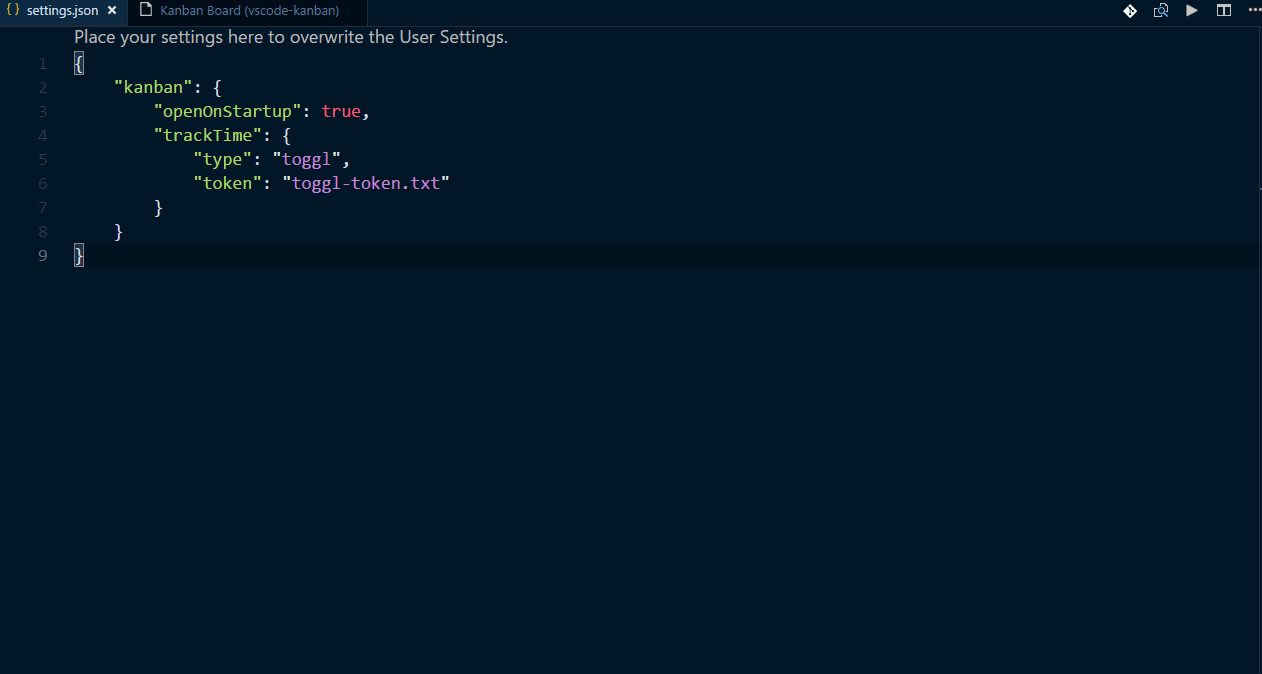Kanban board for Visual Studio Code.
Install [↑]
Launch VS Code Quick Open (Ctrl + P), paste the following command, and press enter:
ext install vscode-kanbanOr search for things like vscode-kanban in your editor.
How to use [↑]
How to execute [↑]
Press F1 and enter one of the following commands:
| Name | Description | command |
|---|---|---|
Kanban: Open Board ... |
Opens a kanban board of a workspace (folder). | extension.kanban.openBoard |
Settings [↑]
Open (or create) your settings.json in your .vscode subfolder of your workspace or edit the global settings (File >> Preferences >> Settings).
Add a kanban section:
{
"kanban": {
"openOnStartup": true
}
}| Name | Description |
|---|---|
canExecute |
Indicates if an execute button should be shown on every card, which invokes an onExecute() function inside the underlying .vscode/vscode-kanban.js script file (s. Handle events). Default: (false) |
cleanupExports |
Remove existing export files, before regenerate them. Default: (true) |
columns |
Custom column settings. |
exportOnSave |
Export cards to external Markdown files on save or not. Default: (false) |
exportPath |
The custom path where export files, like cards, should be stored. Relative paths will be mapped to the .vscode subfolder of the underlying workspace. Default: .vscode subfolder of the underlying workspace. |
globals |
Custom data, which can be used inside the extension, like event scripts. |
maxExportNameLength |
The maximum size of the name of an export file. Default: 48 |
noScmUser |
Do not detect username via source control manager like Git. Default: (false) |
noSystemUser |
Do not detect username of operating system. Default: (false) |
noTimeTrackingIfIdle |
Do not show 'track time' button, if a card is stored in 'Todo' or 'Done'. Default: (false) |
openOnStartup |
Opens a board, after a workspace (folder) has been loaded. Default: (false) |
simpleIDs |
Use integer values as IDs for cards instead. Default: (true) |
trackTime |
Settings for time tracking feature. Default: (false) |
Markdown support [↑]
Card descriptions can be formatted with Markdown, which is parsed by Showndown library.
The extension uses the following settings:
{
"completeHTMLDocument": false,
"encodeEmails": true,
"ghCodeBlocks": true,
"ghCompatibleHeaderId": true,
"headerLevelStart": 3,
"openLinksInNewWindow": true,
"simpleLineBreaks": true,
"simplifiedAutoLink": true,
"strikethrough": true,
"tables": true,
"tasklists": true
}Code blocks are parsed by highlight.js and all provided languages are included and supported.
Diagrams and charts [↑]
Card descriptions can also include diagrams and charts, using a language parsed and rendered by mermaid.
Those diagram / chart descriptions has to be put into a Markdown code block, which uses mermaid as language:
Example graph:
```mermaid
graph TD;
A-->B;
A-->C;
B-->D;
C-->D;
```
Filter [↑]
Cards can be filtered by using a powerful language, provided by filtrex library.
Constants [↑]
| Name | Description | Example |
|---|---|---|
assigned_to |
The value that indicates where the current card is assigned to. | assigned_to == "Marcel" or assigned_to == "Tanja" |
cat |
Short version of category. |
cat == "My Category" |
category |
Stores the unparsed category value of the current card. | category == "My Category" |
description |
The description of the current card. | description == "My description" |
details |
The details of the current card. | details == "My details" |
id |
The ID of the card. | id == "20180628102654_516121916_3f99e5abbe05420e1e5114d235ded3a2" |
is_bug |
Is (true) if card type is Bug / issue. |
not is_bug |
is_emerg |
Short version of is_emergency. |
is_emerg or is_bug |
is_emergency |
Is (true) if card type is Emergency. |
is_emergency or is_bug |
is_issue |
Alias of is_bug. |
is_bug or is_issue |
is_note |
Is (true) if card type is Note / task. |
not is_note |
is_task |
Alias of is_note. |
not is_task |
prio |
Short version of priority. |
prio > 10 |
priority |
Stores the priority value. | priority > 10 |
no |
(false) |
no == false |
now |
The current local time as UNIX timestamp. | now > 305413740 |
tag |
The tag value. | tag == "by MK" |
time |
The (creation) time of the card as UNIX timestamp (UTC). | time > 305413740 |
title |
The title of the card. | title == "My card title" |
type |
The type of the card (lower case). | type == "bug" or type == "emergency" |
utc |
The current UTC time as UNIX timestamp. | utc > 305413740 |
yes |
(true) |
yes == true |
Functions [↑]
| Name | Description | Example |
|---|---|---|
all(val, ...args) |
Handles a value as string and checks if all string arguments can be found inside it (case insensitive). | all(assigned_to, "kloubert", "Marcel") |
any(val, ...args) |
Handles a value as string and checks if any string argument can be found inside it (case insensitive). | any(assigned_to, "Tanja", "Marcel") |
concat(...args) |
Handles arguments as strings and concats them to one string. | concat(5, "9.1", 979) == "59.1979" |
contains(val, searchFor: string) |
Handles a value as a string and searches for a sub string (case insensitive). | contains(assigned_to, "Marcel") |
debug(val, result? = true) |
Logs a value. | debug( concat(title, ": ", id) ) |
float(val) |
Converts a value to a float number. | float("5.979") == 5.979 |
int(val) |
Short version of integer(). |
int("5.979") == 5 |
integer(val) |
Converts a value to an integer number. | integer("5.979") == 5 |
is_after(date, alsoSame?: bool = false) |
(true), if a card has been created after a specific time. |
is_after("1979-09-05") |
is_assigned_to(val) |
(true), if a card is assigned to someone (case insensitive). |
is_assigned_to("Marcel Kloubert") |
is_before(date, alsoSame?: bool = false) |
(true), if a card has been created before a specific time. |
is_before("2019-09-05") |
is_cat(name: string) |
Short version of is_category(). |
is_cat("My category") |
is_category(name: string) |
(true), if a card belongs to a specific category (case insensitive). |
is_category("My category") |
is_empty(val) |
Converts a value to a string and checks if value is empty or contains whitespace only. | is_empty(assigned_to) |
is_nan(val, asInt?: bool = false) |
Checks if a value is NOT a number. | is_nan(prio) |
is_nil(val) |
Checks if a value is (null) or (undefined). |
is_nil(category) |
is_older(days: number, alsoSameDay?: bool = false) |
(true), if a card is older than a specific number of days. |
is_older(30) |
is_younger(days: number, alsoSameDay?: bool = false) |
(true), if a card is younger than a specific number of days. |
is_younger(30) |
norm(val) |
Short version of normalize(). |
norm(" Marcel Kloubert ") == "marcel kloubert" |
normalize(val) |
Converts a value to a string and converts the characters to lower case by removing leading and ending whitespaces. | normalize(" Marcel Kloubert ") == "marcel kloubert" |
number(val) |
Alias of float(). |
number("5.979") == 5.979 |
regex(val, pattern: string, flags?: string) |
(true) if a value matches a regular expression. s. RegExp |
regex(assigned_to, "^(marcel|tanja)", "i") |
str(val) |
Converts a value to a string. | str(59.79) == "59.79" |
str_invoke(val, methods: string, ...args) |
Handles a value as string and invokes methods for it. s. String | str_invoke(assigned_to, "trim,toLowerCase") == "marcel" or str_invoke(assigned_to, "indexOf", "Marcel") > -1 |
unix(val, isUTC?: bool = true) |
Returns the UNIX timestamp of a date/time value. | time > unix("1979-09-05 23:09:00") |
For more functions, s. Expressions.
If a filter expression is invalid or its execution fails, a log entry will be written.
Handle events [↑]
For handling events, you can create a Node.js JavaScript file, called vscode-kanban.js, inside your .vscode subfolder of your workspace and start with the following skeleton (s. EventScriptModule interface):
// all 'args' parameters are based on
// 'EventScriptFunctionArguments' interface
//
// s. https://mkloubert.github.io/vscode-kanban/interfaces/_workspaces_.eventscriptfunctionarguments.html
// use any Node.js 7 API, s. https://nodejs.org/
const fs = require('fs');
// use VSCode API, s. https://code.visualstudio.com/docs/extensionAPI/vscode-api
const vscode = require('vscode');
// [OPTIONAL]
//
// Is raised after a CARD has been CREATED.
exports.onCardCreated = async (args) => {
// args.data => s. https://mkloubert.github.io/vscode-kanban/interfaces/_boards_.cardcreatedeventdata.html
// access a module of that extension
// s. https://github.com/mkloubert/vscode-kanban/blob/master/package.json
const FSExtra = args.require('fs-extra');
// write own data to
// 'tag' property of a card (args.tag)
//
// also works in:
// - onCardMoved()
// - onCardUpdated()
await args.setTag( 'Any JSON serializable data.' );
};
// [OPTIONAL]
//
// Is raised after a CARD has been DELETED.
exports.onCardDeleted = async (args) => {
// args.data => s. https://mkloubert.github.io/vscode-kanban/interfaces/_boards_.carddeletedeventdata.html
};
// [OPTIONAL]
//
// Is raised after a CARD has been MOVED.
exports.onCardMoved = async (args) => {
// args.data => s. https://mkloubert.github.io/vscode-kanban/interfaces/_boards_.cardmovedeventdata.html
};
// [OPTIONAL]
//
// Is raised after a CARD has been UPDATED.
exports.onCardUpdated = async (args) => {
// args.data => s. https://mkloubert.github.io/vscode-kanban/interfaces/_boards_.cardupdatedeventdata.html
};
// [OPTIONAL]
//
// Is raised after a column has been cleared.
exports.onColumnCleared = async (args) => {
// args.data => s. https://mkloubert.github.io/vscode-kanban/interfaces/_boards_.columnclearedeventdata.html
};
// [OPTIONAL]
//
// Is raised when an user clicks on a card's 'Execute' button.
// This requires global extension / workspace setting 'canExecute' to be set to (true).
exports.onExecute = async (args) => {
// args => https://mkloubert.github.io/vscode-kanban/interfaces/_workspaces_.eventscriptfunctionarguments.html
// args.data => s. https://mkloubert.github.io/vscode-kanban/interfaces/_boards_.executecardeventarguments.html
};
// [OPTIONAL]
//
// Is raised when an user clicks on a card's 'Track Time' button.
// This requires global extension / workspace setting 'canTrackTime' to be set to (true).
exports.onTrackTime = async (args) => {
// args => https://mkloubert.github.io/vscode-kanban/interfaces/_workspaces_.eventscriptfunctionarguments.html
// args.data => s. https://mkloubert.github.io/vscode-kanban/interfaces/_boards_.tracktimeeventarguments.html
};
// [OPTIONAL]
//
// Generic fallback function, if a function is not defined for an event.
exports.onEvent = async (args) => {
// args.name => name of the event
// args.data => object with event data
};Time tracking [↑]
Simple time tracking [↑]
Set the value of trackTime inside your .vscode/settings.json to (true):
{
"kanban": {
"trackTime": true
}
}This will run a simple workflow, which writes all required data to the tag property of the underlying card (s. .vscode/vscode-kanban.json).
Toggl [↑]
To use the build-in Toggl integration, you have to setup your personal API token, which can you find in your profile settings:
{
"kanban": {
"trackTime": {
"type": "toggl",
"token": "<YOUR-API-TOKEN>"
}
}
}If you do not want (or if you not able) to save the token in the settings, you can define the path to a text file, which contains it.
For example, create a text file inside your home directory, like toggl.txt, and write the token there. After that, you must define the path of the text file in the settings (.vscode/settings.json):
{
"kanban": {
"trackTime": {
"type": "toggl",
"token": "toggl.txt"
}
}
}You also can define an absolute path, like D:/toggl/api-token.txt or /home/mkloubert/toggl-api-token.txt.
For the case, your board belongs to a specific Toggl project and you know its ID, you can define it explicitly:
{
"kanban": {
"trackTime": {
"type": "toggl",
"token": "<API-TOKEN>",
"project": 123
}
}
}Custom time tracking [↑]
For handling 'track time' events, you can create or edit a Node.js JavaScript file, called vscode-kanban.js, inside your .vscode subfolder of your workspace and add the following function:
exports.onTrackTime = async (args) => {
// args => https://mkloubert.github.io/vscode-kanban/interfaces/_workspaces_.eventscriptfunctionarguments.html
// args.data => s. https://mkloubert.github.io/vscode-kanban/interfaces/_boards_.tracktimeeventarguments.html
// use any Node.js 7 API, s. https://nodejs.org/
const fs = require('fs');
// use VSCode API, s. https://code.visualstudio.com/docs/extensionAPI/vscode-api
const vscode = require('vscode');
// access a module of that extension
// s. https://github.com/mkloubert/vscode-kanban/blob/master/package.json
const moment = args.require('moment');
// options from the settings, s. below
const OPTS = args.options;
// start implement your workflow here
};You also have to update the extension settings:
{
"kanban": {
"trackTime": {
"type": "script",
"options": {
"MK": 239.79,
"TM": "5979"
}
}
}
}Customization [↑]
Columns [↑]
An example of setting up custom column names:
{
"kanban": {
"columns": {
"done": "Finished",
"inProgress": "Work",
"testing": "Currently Testing",
"todo": "Ideas and TODOs"
}
}
}CSS [↑]
If you want to style your board, you can create a file, called vscode-kanban.css, inside your .vscode sub folder of the underlying workspace or your home directory.
Have a look at the files board.css and style.css to get an idea of the CSS classes, that are used.
Logs [↑]
Log files are stored inside the .vscode-kanban/.logs subfolder of the user's home directory, separated by day.
Support and contribute [↑]
If you like the extension, you can support the project by sending a donation via PayPal to me.
To contribute, you can open an issue and/or fork this repository.
To work with the code:
- clone this repository
- create and change to a new branch, like
git checkout -b my_new_feature - run
npm installfrom your project folder - open that project folder in Visual Studio Code
- now you can edit and debug there
- commit your changes to your new branch and sync it with your forked GitHub repo
- make a pull request
The complete API documentation can be found here.
Contributors [↑]
Related projects [↑]
vscode-helpers [↑]
vscode-helpers is a NPM module, which you can use in your own VSCode extension and contains a lot of helpful classes and functions.







